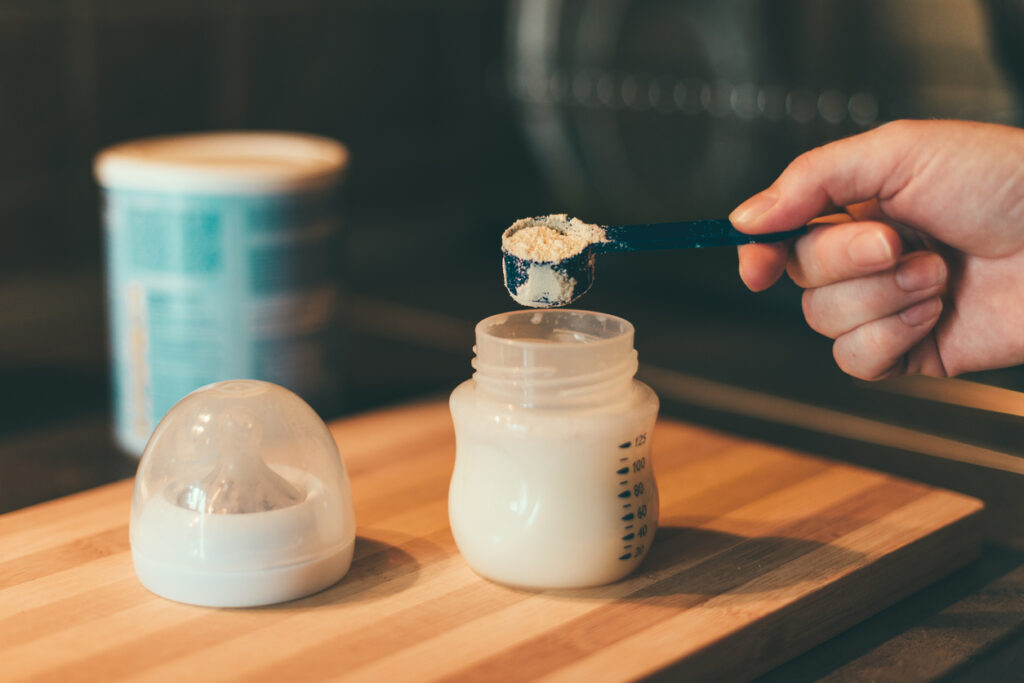Lactose Intolerance in Babies: What Formula to Choose

In babies in the first months of life, lactose intolerance is more often temporary against the background of the immature gastrointestinal tract after an intestinal infection, allergies, and other causes. Congenital lactase deficiency is rare, occurring in 5-6% of cases.
If parents see that a baby has signs of lactase deficiency, the first thing to do is visit a pediatrician. Only an experienced pediatrician can understand why the baby has colic or green stools, what the lab results say, and what is normal for one baby and pathology for another.
When talking about the inability to digest dairy products, it should be noted that the body can not tolerate the protein of cow’s milk. However, in this case, we are not talking about lactose intolerance but an allergy to cow’s milk protein.
Lactose and lactase: Lactose intolerance

One of the causes of digestive problems in a baby in the first year of life is lactase deficiency. This is a pathological condition in which lactose is poorly absorbed due to insufficient production of lactase. So, lactose is a so-called “milk sugar,” a carbohydrate found in milk and dairy products. Lactase is the enzyme needed to break down lactose into simpler components (glucose and galactose). Thus, lactase deficiency is a disease in which the body of a child or adult does not properly digest milk. As a result, after feeding, the baby’s stomach begins to hurt and bloat. The baby’s stools become watery, and the baby may regurgitate food frequently. The more gas accumulates in the intestines, the more anxious the baby becomes and cries a lot. However, the same symptoms can occur in a baby not only because of lactose intolerance.
There may be many reasons why your baby may have a tummy ache, loose stools, or gas:
- Food in the baby’s diet that is not age-appropriate and not suitable for the immature digestive system
- New milk formula introduced into the baby’s diet
- Overfeeding your baby
- Incorrectly introduced complementary foods
- Nutritional imbalance
Bloating can cause the baby’s abdomen to swallow air if the breastfeeding latch is incorrect. In addition, it is very important what products the breastfeeding mom eats, not just the baby: many products in the mother’s diet cause flatulence in infants, especially in newborn babies. Consumption of fruit, juices, legumes, walnuts, and other products by a nursing mother often causes flatulence in the baby.
Signs of the lactose intolerance
Lactose intolerance has certain symptoms. Parents should pay particular attention if the baby has:
- Diarrhea (foamy or frothy stools);
- Increased gas;
- Bloating and stomach pain;
- Underweight or sudden weight loss.
Remember that these symptoms should not cause panic in parents but only be a reason to make an extra pediatrician’s appointment. Such symptoms are quite common in babies and do not always point to lactose intolerance.
Lactose-free formula: Lactose intolerant baby’s diet

When babies are diagnosed lactose intolerant, it is recommended to use baby products that contain enzymes in their composition. Formulas with a low amount of milk sugar or without the presence of lactose are prescribed for babies on formula feeding who have already shown the first symptoms of lactose intolerance.
According to expert reviews, there is one rule: lactose-free formula refers to therapeutic products, and feeding a baby without a doctor’s prescription can negatively affect the baby’s digestive system.
Most often, pediatricians advise feeding babies lactose-free formulas during acute conditions, and after the recovery phase, gradually return to the regular diet. Such formulas are also used when lactase deficiency arises due to digestive diseases. For example, when a baby is found to have an infection in the intestines, it is recommended to transfer to lactose-free formula feeding. But when the baby recovers, it is gradually and very carefully returned to regular milk formula. The doctor prescribes the duration of intake of this formula based on the individual characteristics of the baby’s body.
Specialists may prescribe a lactose-free formula for premature babies who have been diagnosed with temporary lactose intolerance. The formulas recommended by pediatricians contain the lowest lactose values and are intended exclusively for babies born prematurely.
Important: It is not necessary to stop breastfeeding your baby in case of lactose deficiency. You should only stop breastfeeding if your pediatrician has made the appropriate diagnosis.
Virtually every baby food manufacturer has a lactose-free formula in their product range, usually marked as “LF” (lactose-free) on the package.
What is the difference between lactose-free and regular milk formula?
The main difference is that lactose-free formula does not contain lactose in its composition, and it is not regular baby food, like milk formulas.
It is a therapeutic product that should be given only on prescription. Lactose-free baby formula for infants and toddlers has a special composition, in which there is no lactose, and the components make up for the lack of substances in the baby’s body. These formulas include goat’s or cow’s milk with reduced protein content or non-lactose substitutes, such as soy. At the same time, lactose-free formulas have high levels of vitamins and trace elements. Lactose-free goat’s milk formulas have been shown to be better digestible and more nutritious.
The disadvantages of lactose-free formulas

Side effects to a particular food product in your baby’s diet, including lactose-free formula, depend only on the individual characteristics of the baby’s body.
- In some cases, lactose-free formulas based on soy protein isolate may not suit a baby and provoke an allergy to soy and soy protein.
- Introducing it too quickly into a baby’s diet can provoke constipation.
- Feeding these foods for too long disturbs the gastrointestinal tract, resulting in symptoms like flatulence, gas, colic, constipation and diarrhea, dysbiosis, changes in the color of stools, and bloating the stomach.
The quality of the product is also an important consideration when choosing baby food. The components of the baby formula and the production technology must comply with all requirements and quality standards for baby food. For example, baby food brands on organicsbestshop.com offer organic formulas that have passed all necessary certifications before reaching the consumer.
If parents are in doubt about which lactose-free formula is best, consumer reviews are not always helpful. Every child is different, and reaction to the new food is unlikely to be considered determinative for another baby.
It is much better to follow the doctor’s recommendations, explaining in detail how to take a lactose-free formula. As you gradually change the diet, carefully monitor your baby’s condition to ensure that his or her diet therapy is having a positive effect.




